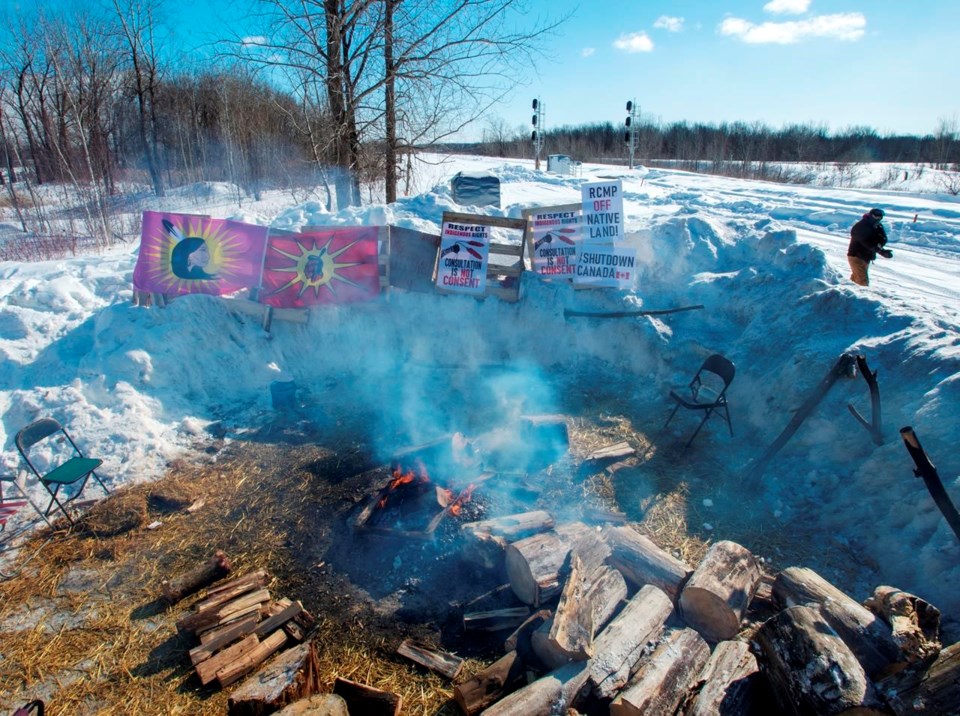EDMONTON — The Canadian National Railway Co. acknowledged its colonial history but stopped short of an apology Monday after an advisory council of prominent Indigenous leaders resigned.
The co-chairs of the council said the company has failed to acknowledge past wrongs and follow its recommendations for reconciliation.
The resignations by all 12 members take effect Dec. 31.
Co-chairs Murray Sinclair, a former senator and head of the Truth and Reconciliation Commission, and Roberta Jamieson, the first female First Nations lawyer in Canada, said in a statement that they tried to foster understanding, connections and transparency in outlining steps for the railway's reconciliation efforts.
They said they were firm that the 104-year-old railway needs to "acknowledge past harms to Indigenous communities and to implement an apology framework."
The company has “missed the mark” on reconciliation, they said.
“Regardless of who was in charge, CN played a role in the oppression of Indigenous Peoples and there is no path forward without that acknowledgment,” the co-chairs said in the statement.
“Rail and freight cars represent the strong arm of oppression in early Canadian history.”
CN put out on Monday a formal acknowledgment of the historical role railways played "as instruments of colonial policies," and noted the social, cultural and economic toll they have taken on generations of Indigenous communities.
“CN is committed to its journey towards reconciliation. That journey begins with a better understanding of history, and thoughtful commitments coupled with robust governance to measure our performance against those commitments,” said Olivier Chouc, vice-president responsible for Indigenous relations.
CN thanked the council members for their contributions and said it has accepted their resignations.
The railway said it operates in or near about 230 reserve lands in Canada.
Historians have said the building of Canada's railways often meant land dispossession and starvation for Indigenous people.
Gord Hill, a Kwakwakwa’wakw artist and activist, describes trains as “engines of colonization” in “The 500 Years of Resistance Comic Book.”
University of Regina professor James Daschuk said in his book "Clearing the Plains" that trains brought settlers and were a “fatal disease vector.” He wrote that in the late 1800s, almost 5,000 Indigenous people were removed from the Cypress Hills in Saskatchewan by withholding food rations to make room for the Canadian Pacific Railway.
"The construction of the Canadian Pacific Railway marked the end of freedom and independence for the Indigenous people on the plains," Daschuk said in a phone interview.
He said railways were built to extract and transport resources from and through Indigenous lands, and the interests of corporations are often fundamentally at odds with Indigenous communities.
"In many cases, statements of corporations and other institutions regarding reconciliation do not match their actions in that regard."
Gary LaPlante, a member of Moosomin First Nation in west-central Saskatchewan, said the Grand Trunk Pacific Railway was built through the reserve prior to 1905, with no consultation or accommodation. The Grand Trunk later became CN.
"Moosomin has had the option of taking legal action for compensation, but hadn't because we'd prefer to have a long-standing mutually beneficial arrangement with CN, kind of a reconciliation effort."
LaPlante said he thought that relationship could be achieved but the advisory council resignations may change that.
When the council was formed in 2021, CN said it was to be independent and made up of Indigenous leaders, with representation of First Nations, Inuit and Métis people from each province and territory.
Its mandate was to provide advice, with goals of reinforcing diversity and inclusion, as well as fostering meaningful and long-lasting relationships between the railway and Indigenous Peoples.
Sinclair said in a telephone interview that council discussions with CN are confidential.
"We've decided that our utility to CN is no longer worth the effort that we're putting out and that they need to decide what to do about that," he said.
In their statement, Sinclair and Jamieson said that when they agreed to their roles, they wanted to make CN a better company and that the railway understood success was dependent on bettering its relationships with Indigenous people.
“We were received with great enthusiasm and positive intent by CN at the time,” they said.
That changed after the council released a report with recommendations for the company, they said.
"It became clear to us that CN had no intention of acknowledging and accepting their role in the historical and ongoing impact on Indigenous Peoples."
They said the company's reconciliation action plan will fail if it’s not based on “full acceptance of responsibility.”
"We are concerned that to continue our work any longer would mislead Indigenous Peoples as to CN’s sincerity and authenticity to reconcile," the co-chairs wrote.
They also urged CN to take a critical look at what it is doing as an organization, look at its scope of influence and transform the way it does business, while continuing to consult with Indigenous people.
CN said Monday it has put together a team of nine managers that includes Indigenous and regional representation to foster respectful relationships with Indigenous communities and develop the railway's "reconciliation action plan" along with senior executives.
It said it plans to release the plan next year with "specific, measurable initiatives" followed by regular updates on its performance versus its goals.
This report by The Canadian Press was first published Dec. 11, 2023.
— With files from Christopher Reynolds in Montreal
Jamin Mike, The Canadian Press



